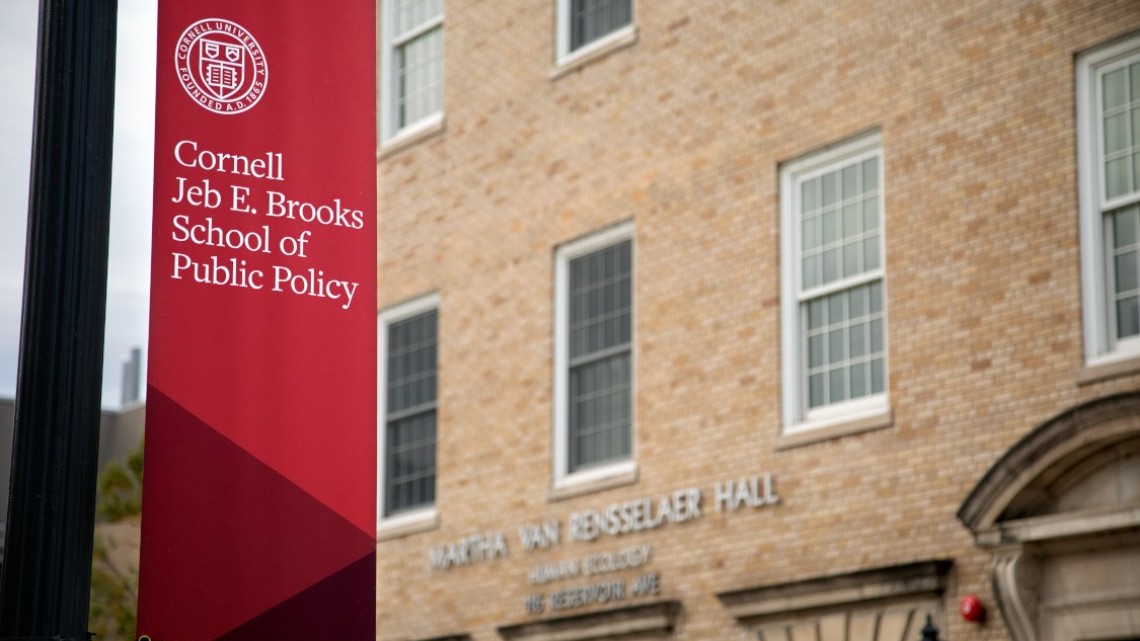
The Cornell Jeb E. Brooks School of Public Policy is the home of the Institute of Politics and Global Affairs. IOPGA is hosting an event offering expert analysis of challenges to U.S. foreign policy.
News directly from Cornell's colleges and centers
Experts to weigh in on emerging foreign policy threats
By Jim Hanchett
Three influential experts in foreign policy will analyze the impact of the war in Ukraine, China’s intensified projection of power and other emerging threats to the U.S. at an April 11 event organized by the Institute of Politics and Global Affairs (IOPGA) at the Cornell Jeb E. Brooks School of Public Policy.
The virtual event - Emerging Threats to U.S. National Security: From Ukraine to the South China Sea – will begin at 4:30 p.m. on Monday, April 11 and is open to all by pre-registration.
The conversation will include three panelists with a range of foreign policy experience:
- Annie Pforzheimer is a Senior Non-Resident Associate at the Center for Strategic and International Studies and a public commentator on foreign policy. Her diplomatic career included positions such as Deputy Chief of Mission in Kabul, Afghanistan; director of the U.S. Security Assistance Program in Mexico; lead human rights officer in Turkey and South Africa; and Director for Central America migration issues at the National Security Council. Pforzheimer is a member of the Council on Foreign Relations.
- James Rogers is affiliated with the Centre for War Studies at Southern Denmark University and the London School of Economics. He is Special Advisor to the United Kingdom Parliament's All-Party Parliamentary Group on Drones. His research focuses on drone warfare, contemporary security policy, and the history of warfare, and it has been featured in the Washington Post, Economist, CNN, and the Guardian.
- Daniel Stoian is a Fellow with the Negotiation Task Force at the Davis Center for Russian and Eurasian Studies at Harvard and most recently served as Deputy Assistant Secretary in the Legislative Affairs Bureau at the U.S. Department of State. Previously he served as the Deputy Executive Director in the South Central Asia Bureau.
This event is a follow-up to an IOPGA event that marked the twentieth anniversary of the 9/11 terror attacks in September 2021. To mark that occasion, panels of practitioners and academic thought leaders reflected on the events of the last two decades and analyzed their implications for future foreign policy challenges facing the U.S. The upcoming discussion will focus on the many ways global conditions have changed since last September.
“In just six months, existing challenges, such as China’s muscle in the South China Sea, have intensified and altogether new challenges have emerged, most dramatically the Russian invasion of Ukraine,” said government professor Douglas Kriner, one of the moderators of the event. “The NATO alliance, once derided as a Cold War Relic, is once again central, and defense spending is once again increasingly swiftly in most western democracies. This panel discussion will engage these and other developments since September 2021 and examine what they portend for the future of U.S. foreign policy.”
Kriner is the Clinton Rossiter Professor in American Institutions in the Department of Government in the College of Arts and Sciences, a professor in the Cornell Jeb E. Brooks School of Public Policy, and the IOPGA faculty director. He is the author of five books, including (with Dino Christenson) The Myth of the Imperial Presidency: How Public Opinion Checks the Unilateral Executive; After the Rubicon: Congress, Presidents, and the Politics of Waging War; and (with Francis Shen) The Casualty Gap: The Causes and Consequences of American Wartime Inequalities.
Sarah Kreps will join Kriner in moderating the event. She is the John L. Wetherill Professor of Government in the College of Arts and Sciences, a professor in the Cornell Jeb E. Brooks School of Public Policy, and Director of the Cornell Tech Policy Lab. She is also a Non-Resident Senior Fellow at the Brookings Institution. Kreps has held fellowships at the Council on Foreign Relations (where she is a life member), Harvard’s Kennedy School of Government, and the University of Virginia’s Miller Center for Public Affairs, in addition to serving on active duty in the U.S. Air Force from 1999-2003.
Coinciding with the discussion will be the publication of latest issue of the IOPGA’s Bipartisan Policy Review. It includes analyses from each of the participants at the September 2021 Future of US Foreign Policy Conference.
Media Contact
Get Cornell news delivered right to your inbox.
Subscribe
